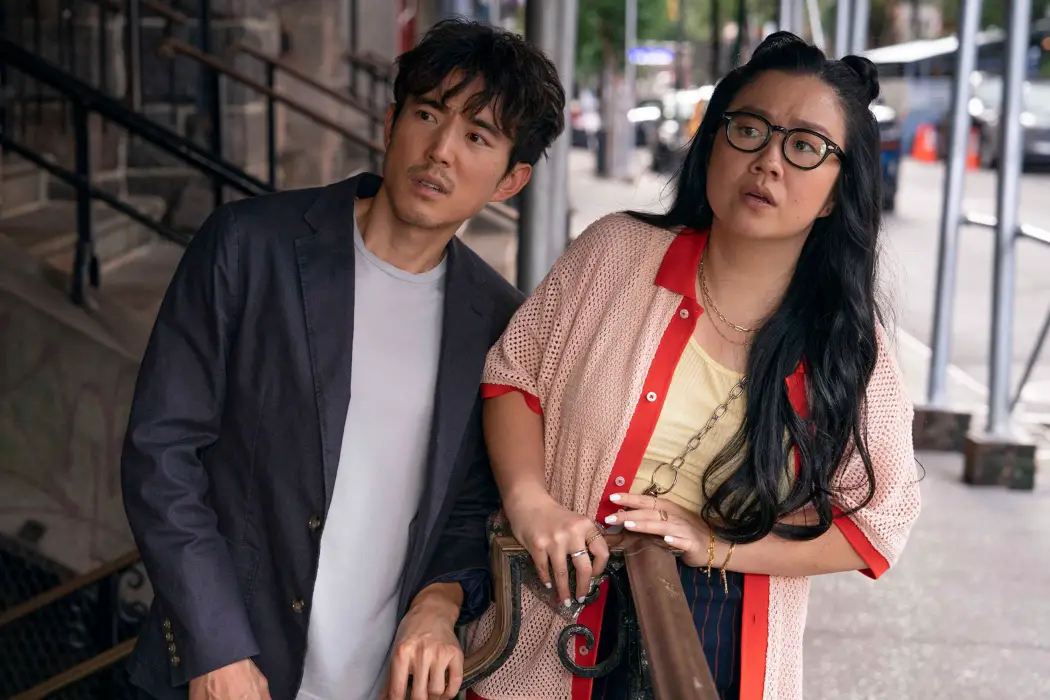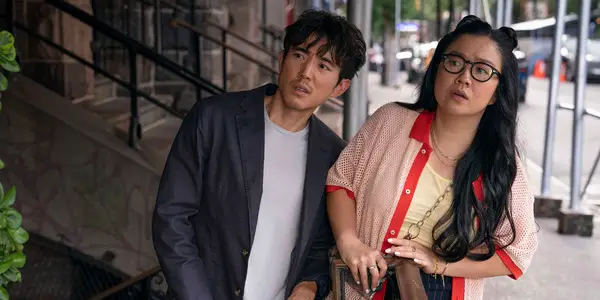Interview With Composer Gene Back Of SHORTCOMINGS

Wilson is a cinema enthusiast based out of Toronto, Canada.…
Randall Park‘s directorial debut, Shortcomings, is a quirky comedy that piles on layers of nuance to the modern Asian-American narrative. It made a splash during its world premiere at this year’s edition of the Sundance Film Festival, and was subsequently acquired by Sony Pictures Classics. Gene Back is a Korean-American composer and instrumentalist who captures the film’s unique energy with a score that makes a thoughtful impression. Back spoke with Film Inquiry after the film’s Sundance premiere about his approach to writing music and the changing landscape of representation in cinema.
Wilson Kwong for Film Inquiry: Before we get into the film itself, maybe you can talk about how being an instrumentalist informed your decision to go into composing musical scores?
Gene Back: It’s a bit of a winding story, but I started playing violin at an early age, studying classically. And I come from a very musical family. My mom plays piano and my dad was an opera teacher. So I’ve always had music in the house and in my life. But it really wasn’t until I was a teenager that I started to “compose” songs. When I started teaching myself guitar is when I really fell in love with writing songs. And it really wasn’t until my later twenties, after I did a bunch of touring with bands, that I started composing for visual media. I started off by actually writing for commercials, and because of my skillset and training in the classical world and also in bands and popular music, I was lucky to work on more cinematic things.
And as part of that journey, were there specific composers that were inspirations to you?
Gene Back: Yeah. I consider myself to follow more in the “tradition” of thematic film composing. And so, the king of thematic composing, you could point to John Williams. Of course, I’m not a John Williams! But there’s something really cool about thematic film composing, which I’ve gravitated towards my whole life. From James Horner – rest in peace – and another iconic thematic composer, Alan Menken, despite most of his work being in Disney movies, he’s just incredible. He’s a big inspiration for me when it comes to the thematic treatment of score.
With Shortcomings, I think something unique about the score is that there are a lot of different instruments being used, which isn’t something you normally expect from a film like this. Did you have a lot of discussions with Randall Park beforehand to figure out how the film would sound like?
Gene Back: We had a bunch of discussions before actually starting on the score, and just brainstorming about the kind of sound we wanted to capture. The big thing was to capture the main character’s psyche and the world inside his head, and how to translate that musically. Whether it’s very quirky or neurotic sounds, to more intimate, early nineties influenced indie rock. All of these things were definitely put into consideration to really capture Ben (played by Justin H. Min), the main character’s psychology, and all of these different funny situations he found himself in. Between being in the Bay Area versus New York, there was a definite shift in the fullness of the sound.
That was also a big directive that Randall had. He wanted the Bay Area to sound intimate and almost small in a way, and we did that by exploring a small band configuration with some woodwinds. And then once we got to New York, we started bringing in some of the more percussive and frenetic energy. The beginning and the end were also linked together through a more full orchestral sound, and that was deliberate. A big inspiration for the score also came from the birth of the French New Wave, which was a nod to Ben’s point of view as a Criterion nerd. One of the cues specifically – Ben Being Ben – is very much influenced by the quirkiness and romanticism of 400 Blows by Truffaut.
Was the score actually recorded by a live orchestra, as opposed to a synthesizer?
Gene Back: Yes, we recorded a live orchestra in Budapest, and it was a combination of the live orchestra and also my own playing. Because I come from a live music background as well, I always try to put my print on every score that I do through my own playing. And so a lot of the solo violin and hand percussion that you hear, that’s all stuff that I actually recorded myself.

And did your own experiences inform how the sound of New York versus Los Angeles was shaped throughout the film?
Gene Back: I’m originally from New York and I’m in Los Angeles now, so when I was doing a bunch of session work and songwriting in the local indie New York scene, I built quite a network of friends and collaborators who I keep in touch with. And when we were doing post-production in New York, I could really ask some of the best musicians in New York who I’d been friends with to hop on this score. Recording a score is hard enough as it is, and it’s always a bonus when you can find people you actually love to hang out with and can lean on their voice. And the drummer, Mark Marshall, he’s a longtime friend of mine, and I just knew that he could bring that sort of sound that had an indie, but professional, quality, as opposed to a squeaky clean session type of player that you could hire as a hired gun.
It also seems rare these days to have a recorded score for an indie project, as opposed to something that’s recorded digitally or synthetically.
Gene Back: In the indie world, you’re always working with a (smaller) budget and an orchestra cost a good amount of money. But thankfully, production set aside a recording budget, which was super helpful and we could explore hiring an orchestra. And it wasn’t a wall-to-wall orchestra, so it wasn’t wildly expensive to do it that way with live players. But I always say, having live players and the space of the players’ room, all those things really contribute to a really unique sound that you just cannot capture synthetically. And while samples have gotten really good these days, and I use them all the time, it’s really important for me as a composer to be able to capture that live-ness.
Being able to perform music yourself must also be pretty advantageous.
Gene Back: Oh definitely. It’s a bit of an asset that I value personally because I can just knock out solo violin, guitar or percussion recordings myself.
Did you also find it difficult getting into the mindset of Ben and shaping a lot of the music around that? Only because I found his character so nuanced, and figure a lot of his characterization might not necessarily come right off the script right away.
Gene Back: It really wasn’t difficult for me to get into the character because I read the graphic novel before. I was brought in to do the film, and it’s a rare example of Asian Americans being portrayed as just regular people. I mean, wow, what a concept! But sadly, that’s just the reality. There just aren’t a ton of stories out there that really show second-generation and onward experiences. I feel like the vast majority is tied to an immigration plant or something to do with being an immigrant. And while that’s certainly part of the Asian-American experience, this story was very unapologetically, like, “Hey, I don’t know what this guy’s saying in Japanese.” And so I was able to really identify with that kind of portrayal, of the Asian-American community. And being Korean-American, there were so many parts of Ben’s awkwardness and experience with internalized racism that felt fairly universal. It was actually not that difficult to get into that mindset and relive some of my own traumas and experiences being an Asian-American and all the funny-ness that can come with that, especially as a millennial.
I suppose that also speaks to the importance of having Asian Americans work on a film about Asian Americans.
Gene Back: Yes, and Randall is such an incredible guy and he really walks the walk when it comes to inclusion and representation. He was so intentional and adamant about bringing in top Asian-American talent to work on his movie, and not for some quota, but for the sake of authenticity and bringing our own experiences to the story. It’s just so important, and I really continue to applaud him for that mission.
Given the very recent success of Everything Everywhere All at Once, I have to ask if you think this level of recognition has trickled down in the industry yet? Specifically in terms of what it might mean for Asian-Americans working in the film industry?
Gene Back: I will say this, we’re miles ahead from where we were 10 years ago. I’m really grateful and thankful for the Daniels for really stepping up and bringing these incredible stories that were not only just powerful and meaningful but also accessible to a broad audience. And I think that’s a big thing that people still wonder. It’s like, oh, can Asian stories, or Asian-American stories be marketable or accessible to the broader audience? I think we are definitely getting there, and I think there’s still a hell of a lot more work to do. And I am just so proud of being part of a film like Shortcoming, that is so affirmatively and unapologetically Asian-American. It’s not a movie from Korea, it’s not a movie that has a bunch of martial arts scenes. As much as I love Everywhere Everything All at Once, there’s still a bunch of martial arts that are fun and great. And I’m not saying that there’s no place for it, but I feel like Asian-Americans or Asians in general still have that weird connection to martial arts or being a foreigner. So I do think we’ve really moved the needle, but I think it’s a little too soon to say whether we’ve made it or can be seen just like everybody else. Because the fact of the matter is, it’s just not true yet, but I think it will be.
Film Inquiry would like to thank Gene Back for taking the time to speak with us!
Watch Shortcomings
Does content like this matter to you?
Become a Member and support film journalism. Unlock access to all of Film Inquiry`s great articles. Join a community of like-minded readers who are passionate about cinema - get access to our private members Network, give back to independent filmmakers, and more.
Wilson is a cinema enthusiast based out of Toronto, Canada. He escapes from his day job by writing random thoughts about cinema on the internet. Although he has a longstanding penchant for Hong Kong cinema, he considers himself to be an advocate for Asian cinema in general. He has been attending the Toronto International Film Festival every year since 2005, and more of his work can be found on his website: www.wilson-kwong.com.













